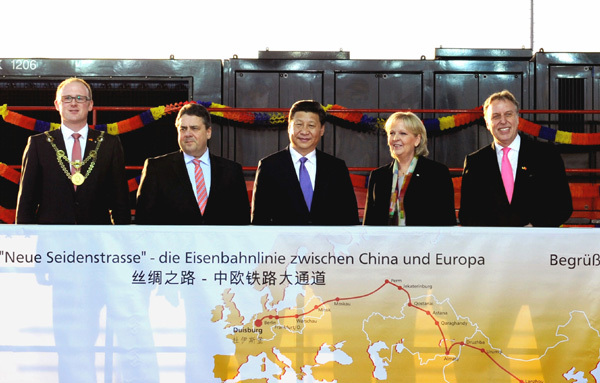Projects can further promote Northeast Asian prosperity
- By Woo Duck Han
 0 Comment(s)
0 Comment(s) Print
Print E-mail China Daily, February 15, 2015
E-mail China Daily, February 15, 2015
|
|
|
Chinese President Xi Jinping (center) visits Port of Duisburg of Germany March 29, 2014. [Photo/Xinhua] |
The "Belt and Road Initiatives" embody China's economic diplomacy under the new leadership led by President Xi Jinping. In particular, the 21st Century Maritime Silk Road manifests China's recent economic diplomatic initiatives such as neighborhood policy, multilateral cooperation and energy diplomacy.
China has become increasingly active in economic diplomacy since becoming a member of the World Trade Organization in 2001. And the "Belt and Road Initiatives" are an important part of that.
The entry into the WTO represented China's integration with the international economic community led by the West, and the 21st Century Maritime Silk Road is the hallmark of Xi's economic diplomacy. Economic diplomacy contains two opposite aspects: one is to promote economic growth through diplomatic measures, and the other is to achieve a certain diplomatic goal by using economic means. The "Belt and Road Initiatives" display both features, but the latter is more prominent.
Such a diplomatic strategy is based on China's knowledge of and attitude toward its neighbors. The US "pivot to Asia" and containment policy and the fact that a growing number of its neighbors are becoming unfriendly or pro-American are both concerns for China. Some of China's neighbors believe that the "Belt and Road Initiatives" are an attempt to redress this situation. If China hopes to make the 21st Century Maritime Silk Road strategy a success, it has to dispel their misgivings.







Go to Forum >>0 Comment(s)